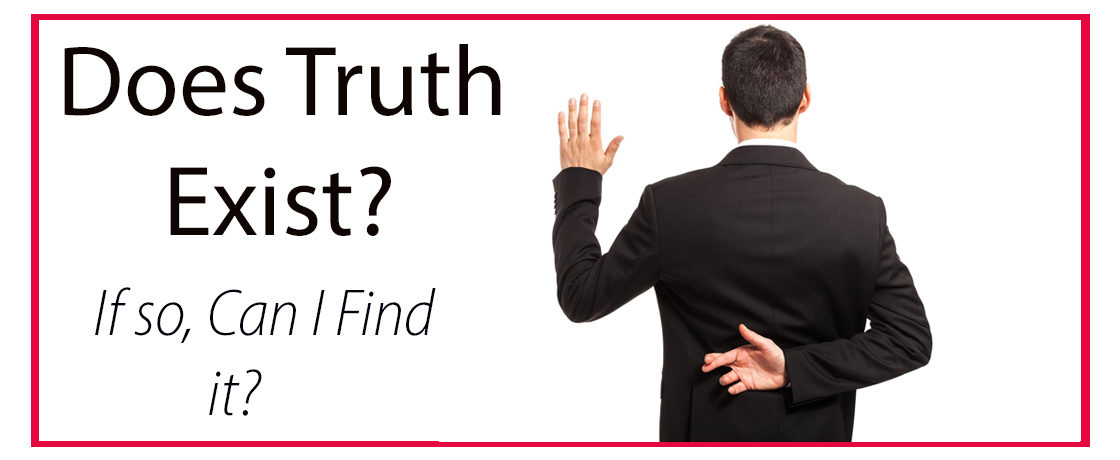Does Truth Exist?
Does Truth Exist?
If So, Can I Find it?
Genesis 1:26a And God said, “Let Us make man in Our image, after Our likeness…
If human beings “arose by chance from the primordial muck, and descended from apes by a combination of chance and the survival of the fittest according to the law of the jungle,” then transparently, what we should think of ourselves will be very different from what we should think of ourselves if the biblical account is true.
If we are just animals, then truth will not matter. If we are the image of God, truth matters most.
What is true?
Genesis 3:1 Now the serpent was more subtle than any beast of the field which the LORD God had made. And he said unto the woman, “Yea, hath God said, ‘You shall not eat of every tree of the garden.’ 4 And the serpent said unto the woman, “You shall not surely die.”
Eve was encouraged to doubt God’s Word, and she did.
Doubting God and His Word Is Not New
The Enlightenment offered the world a new analysis of, and solution to, the problem of evil. It stated that the real problem of evil is that people are not thinking and acting rationally. Enlightenment rationalism was to teach them how, and create the social and political conditions to make it happen.
Whether we opt for the social determinism of Margaret Mead or B. F. Skinner, in which society and environment cause human beings to do good and evil, or for the rising emphasis on a genetic basis for all behavior, the effect is the same: individual human accountability is decreased.
There are rising and impassioned pleas to force government to take responsibility for everything—both the research that will sanction more of these perspectives, and the changes that will allegedly solve our problems. That is exactly where we are today, with gender and bathroom issues.
Why I Do What I Do
Is it really my fault? Do I need help inside?
We must first remember that in terms of ethical behavior, neither nature nor nurture is absolutely determinative. Individuals with the same backgrounds and/or who are carrying the same genes do still head in very different directions. Second, God is still on His throne, providentially governing this fallen world.
The modern world says no to the truth of our need, and of one, true God who is real. Western societies, especially America, have sacrificed the notion of human accountability, and fostered a culture of victimization. Too many conclude, “Everything I do that is wrong is someone else’s fault.” Some victimization is very real. It leaves deep, painful scars, especially emotionally. Unfortunately, too often today’s answers to victimization convince men and women who should be looking for a Savior, to search only for a scapegoat. After all, if I am not to blame for what I do, the Cross is then much ado about nothing. Victims are told they do not need God, just a sympathetic therapist or a good lawyer. They may need both, but without a Savior, it’s really no different than rearranging chairs on the Titanic.
Why do people choose substitutes over God Himself? It obviates accountability to God. We can meet idols on our own terms, because they are our own creations. They are safe, predictable, and controllable. They are, in Jeremiah’s colorful language, the “scarecrows in a cucumber field” (10:5). They are portable and completely under the user’s control. They offer nothing like the threat of a God who thunders from Sinai, and whose providence in this world so often appears to us to be incomprehensible and dangerous. It says, ‘People need face only themselves.’
Is True Truth Important
Our creation in the image of God ensures that human beings are endlessly restless if they suppress or deny this truth; it also makes possible true knowledge of the living God.
The skeptic committed to philosophical materialism must explain the recurring power of religion all over the world. Rudolf Otto argued that it is easier to imagine that finite and fallible individuals would resist belief in a holy God, than that they would dream Him into existence.
The biblical answer is that we have been made in God’s image. However much we have abused ourselves as God’s image bearers until this innate capacity is distorted and twisted, at some deep level we still deeply hunger for its restoration, while scarcely understanding what that means, so we multiply religious placebos.
The Truth Of What Works
The Enlightenment failed to deliver the goods. People not only did not stop fighting one another, but the lands of the Enlightenment became themselves embroiled in conflict. Philosophical pluralism insists that all assertions of worldview and outlook that make exclusive truth claims are necessarily wrong, especially in the religious arena. Radical religious pluralism cannot accept the Bible’s portraits of Jesus as the redeemer.
John 14:6 Jesus said unto him, “I am the Way, the Truth, and the Life; no man cometh unto the Father, but by Me.”
Christians are constantly challenged by pluralists to justify the authority of their position. Pluralists themselves must be challenged to justify the authority of their position. They are claiming things about God, truth, and the nature of reality. The question is, How do they know?
God has revealed the truth clearly through His Word, and Creation. The question is, “Will we believe it?”

